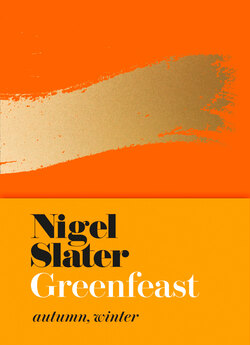Читать книгу Greenfeast - Nigel Slater - Страница 9
ОглавлениеOn a winter’s evening, I warm butter and olive oil in a shallow-sided, cast-iron pan, turn the heat down low and use it to fry thin slices of potato, Jerusalem artichoke or fennel. Vegetables that will crisp or soften as you wish, and to which I can add other ingredients at will – sweet black grapes and whole parsley leaves to the crisp artichokes; peas and salty cheese to the softened fennel. I do the same with slices of pumpkin or butternut squash, then introduce feta or breadcrumbs or perhaps a fried egg whose yolk will double as an impromptu sauce.
A heavy frying pan in which you can leave things to cook at a moderate temperature is worth its weight in gold. It is the gift I would give to a kid leaving home. The possibilities are endless. Mushrooms, sliced and sautéed with herbs to pile on a mound of silken hummus; beans whose outsides slowly crisp in olive oil and are then tossed with tomatoes and a wobbly egg of burrata; Brussels sprouts fried with miso paste to a deep walnut brown, then forked through sticky brown rice. They all give a substantial green and deeply savoury supper. The list is endless.
The success often lies in the pan itself. A pitted or wobbly-based pan will produce uneven results. Sometimes you need a thin-bottomed pan in which to flash-fry, other times a pan as heavy as possible that will hold the heat and which can be left to do its task while you get on with other elements of dinner. Choose your weapon.
It is worth finding a suitable lid. Especially if you are cooking vegetables that need to be brought gently to tenderness before a final crisping, such as potatoes, parsnips and carrots. The sort of heavyweight pans I find so useful for slow winter cooking often come without a lid, so it is not a bad idea to find one that fits before you leave the shop.
I am very fond of my old iron sauté pans, but they do need a bit of care when you first get them home. A good oiling with linseed oil, a long, slow bake in the oven and a careful dry before putting them away will give them a chance to develop a patina, a naturally non-stick layer that will, unlike a commercial non-stick finish, see you through a lifetime of suppers.
